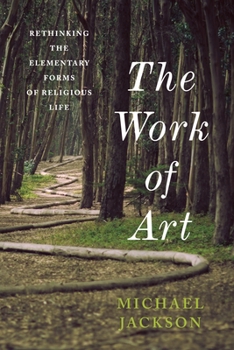The Work of Art: Rethinking the Elementary Forms of Religious Life
(Part of the Insurrections: Critical Studies in Religion, Politics, and Culture Series)
How are we to think of works of art? Rather than treat art as an expression of individual genius, market forces, or aesthetic principles, Michael Jackson focuses on how art effects transformations in our lives. Art opens up transitional, ritual, or utopian spaces that enable us to reconcile inward imperatives and outward constraints, thereby making our lives more manageable and meaningful. Art allows us to strike a balance between being actors and being acted upon.
Drawing on his ethnographic fieldwork in Aboriginal Australia and West Africa, as well as insights from psychoanalysis, religious studies, literature, and the philosophy of art, Jackson deploys an extraordinary range of references--from Bruegel to Beuys, Paleolithic art to performance art, Michelangelo to Munch--to explore the symbolic labor whereby human beings make themselves, both individually and socially, out of the environmental, biographical, and physical materials that affect them: a process that connects art with gestation, storytelling, and dreaming and illuminates the elementary forms of religious life.Format:Hardcover
Language:English
ISBN:0231178182
ISBN13:9780231178181
Release Date:October 2016
Publisher:Columbia University Press
Length:256 Pages
Weight:1.20 lbs.
Dimensions:0.9" x 5.9" x 9.1"
Grade Range:Postsecondary and higher
Related Subjects
Art Arts, Music & Photography Religion Religion & Spirituality Social Science Social SciencesCustomer Reviews
0 rating





